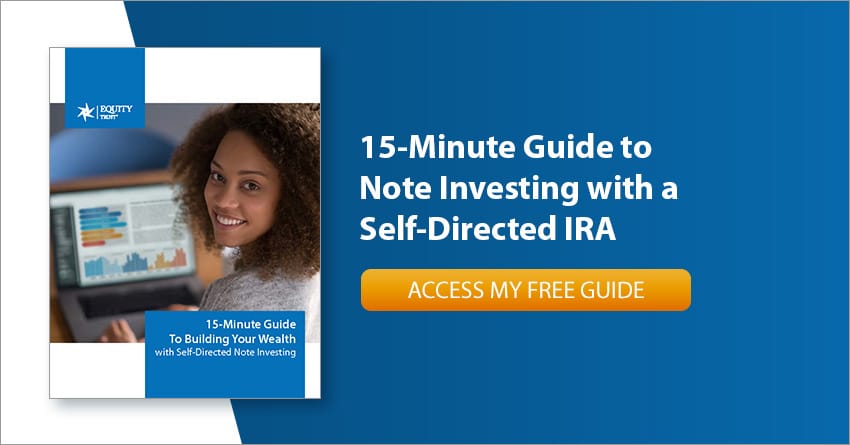50% Off All
Education Courses
Happy Financial Literacy Month!
Enjoy half off all education courses
with code: LITERACY
Investor Insights Blog|Key Fundamentals of the Note Business: Part II
Promissory Note Investing

The following was written by guest blogger Aaron Halderman, owner of NoteWorthyUSA.com.

This is the second part of a two-part series. Read Part I here.
After thousands of note transactions, I’ve learned a thing or two about how to value a note and how to price a note. The first (and most important) lesson I learned is that value and price are two very different things.
As Warren Buffett once said: “Price is what you pay. Value is what you get.” That’s why the price is irrelevant until a value is determined.
So how do we determine value? Well… there are six key factors to consider when valuing a note.
We already covered the first three, so now let’s move on to the rest. (Please refer to Part I if you missed it.)
Some note offers are driven by my required investment yield (i.e., the return I want to receive on the investment). Others are motivated by my investment-to-value (ITV) ratio, or what I like to call my line in the sand, as it represents the most amount of money that I’m willing to put into a deal based upon the value of the property.

Either way, when I am looking at re-performing or performing notes, the terms of the note greatly influence my offer price. The two most important aspects are the interest rate and the payback period.
The interest rate is important because it directly affects the size of the discount (haircut) necessary to achieve your required yield. Industry-standard investor yields on performing notes are typically between 10-16 percent. I advise staying in this range.
So say, for example, I am considering two notes, each with a principal value of $100,000. One is written at 9 percent and the other is written at 6 percent. If I want a 12-percent yield on my investment, and assuming all else is equal, I can buy the 9-percent note for $75,000 (9 percent of $100,000 = 12 percent of $75,000), or I can buy the 6-percent note for $50,000 (6 percent of $100,000 = 12 percent of $50,000).
The lower the interest rate, the more you need to discount the note to achieve your required yield.
As for the payback period…
The payback period is all about the time value of money. In finance 101 they teach that the promise of $1 one year from now is worth less than the promise of $1 today. And the promise of $1 in two years is worth even less.
Consider now that notes represent a series of monthly payments, typically stretching decades into the future. Although each payment is the same dollar amount, every payment has a different value. This value decreases the farther into the future we go. On a 360-month (30-year) loan, 90 percent of the value (in today’s dollars) exists in the first 180 months (15 years).
Let’s look at an example now. Again, assume you’re valuing two notes. Both have 30-year amortizations with equal payments and interest rates. However, one has a balloon payment (i.e., a lump-sum loan payoff) due in five years. The other has a balloon payment in seven years. Because you’re a lot closer to your money with the first note, it has a higher cash value.
Now, this does not mean that you shouldn’t buy the second note. That’s not it at all. It just means the value is lower, so the price should be lower, too.
In fact, I buy long-term notes all the time. Sometimes I buy the whole note and sell a portion of the first several years of payments. But that is an entirely different topic (buying/selling partials). We’ll get to that one in a future issue. The important thing to remember is that value decreases as time increases. Therefore, your offer price should decrease, too.
In the note business, “seasoning” is nothing more than payment history. For example, if a borrower has been making payments on a note for two years, the note has 24 months of seasoning. The more seasoning… the more likely the borrower will continue making payments… the greater the likelihood of continued payments… the more valuable the note.
Makes sense, right?
Let’s compare a re-performing note and a performing note. As a refresher, a re- performing note is a note where a borrower who stopped making payments for an extended period of time began performing again due to a loan modification. A performing note, on the other hand, is a note that has an uninterrupted payment history.
If I’m buying a re-performing note, I like to see six months of seasoning, three at the bare minimum. Any less is simply too short a track record to add value to the note. I like to buy these notes at about a 60-80-percent ITV (i.e., a discount of 20-40 percent) and at the industry standard yield of 10-16-percent yield.
Typically, though not always, performing notes have more seasoning than re-performing notes. As a result, they tend to be more valuable. I usually like to buy performing notes at an ITV of at least 85 percent (i.e., a discount of 15 percent or less) and within the 10-16-percent yield.
Video: Equity Trust Client Greg Discusses Note Investing
If you were buying a used automobile, you would probably look at the blue book value, have the car checked out by a mechanic and get a CarFax report before you buy it. And once you buy the car, you would probably make sure the title is signed and recorded, the car is registered and your insurance is in order.
It works the same way with notes. The best time to vet the note is before you buy it. To determine the property value, you can order a broker’s price opinion (BPO) or verify the one that was provided to you. Review the paperwork so you can see a clear chain of title on the deed, note, and mortgage. Then order a title search. These items are inexpensive, $100 or so each, and should be considered a cost of doing business.
As I said in the previous article, I like to visualize each note investment as a scale. Yield is on one side, and risk is on the other. As you weigh each factor, you add information to one side or the other and see which way the scale tilts. If it tilts within your tolerance, you buy. If it doesn’t you pass.
To illustrate, let’s say that you are looking to purchase a note. As you consider the six key factors, you learn the following information:
Knowing just that, what are your thoughts? My opinion is there are more non-redeeming factors than redeeming ones. The title is good. Credit is bad. Only two payments have been made recently. The note has 26 years of remaining payments at 7 percent.
Now let’s add some new information to the equation. Although there is no equity in the property, it is well maintained. It is also situated in a middle-class neighborhood that shows signs of appreciated property values. The borrower paid a $7,000 reinstatement fee, and his income statement indicates a 22-percent housing expense-to-income ratio and a debt-to-income ratio above 35 percent.
The scale has clearly tilted the other way. This borrower has skin in the game and good debt ratios. He obviously wanted to stay in this property and now makes enough money to afford it.
On this one, I would come in at about an 80-percent ITV with a yield of 12 percent. This would give me a safe and high rate of return. Again, it’s not an exact science, but after 30,000 of these transactions, I’ve gotten a good feel for how to avoid a bad buy. I promise it won’t take you that long.
[Related: When a Performing Note Stops Performing]
About Aaron Halderman
Aaron Halderman has over 15 years of real estate development, distressed debt management, and financial services experience. Aaron owns NoteWorthyUSA.com and is the publisher of the NoteWorthy Newsletter and host of two annual note investing conferences, the NoteWorthy Investors Summit & National Convention. Aaron was a managing partner for a private investment company that acquired over 2,000 single-family assets nationwide and managed over $100 million in note investments.
Aaron holds a Bachelor’s degree in Science from Arizona State University. Aaron loves spending time with his children, traveling, golfing, and following sports stats.
Aaron Halderman is not an employee of Equity Trust Company. Opinions or ideas expressed are not necessarily those of Equity Trust Company nor do they reflect their views or endorsement. These materials are for informational purposes only. Equity Trust Company, and their affiliates, representatives and officers do not provide legal or tax advice. Investing involves risk, including possible loss of principal.
Equity Trust Company is a directed custodian and does not provide tax, legal or investment advice. Any information communicated by Equity Trust is for educational purposes only, and should not be construed as tax, legal or investment advice. Whenever making an investment decision, please consult with your tax attorney or financial professional.
You are leaving trustetc.com to enter the ETC Brokerage Services (Member FINRA/SIPC) website (etcbrokerage.com), the registered broker-dealer affiliate of Equity Trust Company. ETC Brokerage Services provides access to brokerage and investment products which ARE NOT FDIC insured. ETC Brokerage does not provide investment advice or recommendations as to any investment. All investments are selected and made solely by self-directed account owners.
Continue